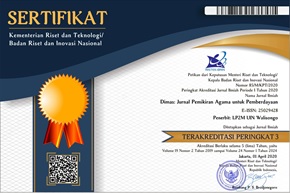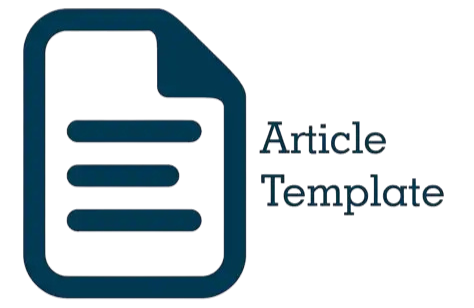Peran Lembaga Pengabdian dan Pengembangan Masyarakat (LP2M) Pesantren Al-Luqmaniyyah Yogyakarta dalam Mengurangi Masalah Krisis Keagamaan di Masyarakat Pelosok
DOI:
https://doi.org/10.21580/dms.2021.211.7825Keywords:
Community Service, , Al-Luqmaniyyah, Islamic Boarding School, Religious CrisisAbstract
Penelitian ini berfokus pada salah satu kegiatan pengabdian yang telah terprogram setiap tahunnya di pondok pesantren Al-Luqmaniyyah Yogyakarta. Sasaran Pengabdian ini dikonsentrasikan pada daerah terpelosok yang dirasa masih membutuhkan pengembangan dan pemberdayaan. Khususnya mengenai pemahaman keagamaan masyarakat yang dinilai masih awam. Metode yang digunakan adalah metode kualitatif deskriptif. Penulis menceritakan hasil pengamatan dan pengalamannya serta dengan penelusuran dari data-data yang sudah didapat dari beberapa responden terkait. Pengambilan data pada penelitian ini menggunakan wawancara semi terstruktur dan observasi. Teknik analisis data dilakukan dengan cara reduksi data, penyajian data, dan penarikan kesimpulan. Hasil penelitian menunjukkan bahwa program tahunan Lembaga Pengabdian dan Pengembangan Masyarakat (LP2M) Pesantren Al-Luqmaniyyah yang dilaksanakan oleh santri-santri sebagai penggeraknya di lapangan, mampu untuk mengurangi krisis keagamaan di masyarakat. Selain itu pula dampak yang dirasakan masyarakat selaku objek dan santri sebagai subjek dari Lembaga Pengabdian dan Pengembangan Masyarakat ini bisa dirasakan oleh seluruh pihak terkait. Lembaga pengabdian dan pengembangan pondok pesantren ini juga masih tetap eksis dari awal berdiri hingga saat ini.
This research focuses on one of the yearly programmed service activities at the Al-Luqmaniyyah Yogykarta Islamic boarding school. This Community Service target focuses on remote areas that still need development and empowerment. Especially regarding the religious understanding of the community which is still common. The method used is descriptive qualitative method. The author tells the results of his observations and experiences and also presents the results of tracing data obtained from several related respondents. The data collection process in this research used semi-structured interviews and observations. The data analysis technique was carried out by means of data reduction, data presentation, and drawing conclusions. The results showed that the annual program of the Institute for Community Service and Development (LP2M) of Al-Luqmaniyyah Islamic Boarding School which was implemented by the students as a driving force was able to reduce the religious crisis in society. In addition, the impact felt by the community as objects and students as subjects of this Community Service and Development Institute can be felt by all parties involved. This institution also still exists today.
Downloads
References
Hubermas, M. B. (1984). Qualitative data Analysis. London : Sage Publication.
Maarif, S. (2020, 12 18). Manfaat Program Safhari Ramadhan. (Charismanto, Interviewer)
Miftahillah, A. (2020, 12 18). Tentang Program Safhari Ramadhan di Pondok Pesantren Al-Luqmaniyah. (Charismanto, Interviewer)
Nazir, M. (1983). Metode Penelitian. Jakarta: Chalia Indonesia.
Rilitama, A. (2020, 12 20). Manfaat Safhari Ramadhan. (Charismanto, Interviewer)
Rohadi. (2008). Rekontruksi Pesantren Masa Depan. Jakarta: PT. Listarafiska Putra.
Sulaeman, D. (2020, 12 18). Inisiasi Program Safhari Ramadhan. (Charismanto, Interviewer)
Fitrah Nugraha (2020) No TitleInilah Asal Usul Penetapan Hari Santri Nasional 22 Oktober, Telisik.
Hidayat, A. (2017) No TitleTeknik Sampling Dalam Penelitian (Penjelasan Lengkap), statistikian. Available at: https://www.statistikian.com/2017/06/teknik-sampling-dalam-penelitian.html (Accessed: 24 February 2020).
Ibrahim, R. (2016) ‘Pesantren Dan Pengabdian Masyarakat (Studi Kasus Pondok Pesantren Dawar Boyolali)’, Al-Tahrir: Jurnal Pemikiran Islam. doi: 10.21154/al-tahrir.v16i1.316.
Wahyudin, D. (2017) ‘PENDIDIKAN ASWAJA SEBAGAI UPAYA MENANGKAL RADIKALISME’, Dinamika Penelitian: Media Komunikasi Penelitian Sosial Keagamaan.
Downloads
Published
Issue
Section
License
Copyright
The copyright of the received article shall be assigned to the journal as the publisher of the journal. The intended copyright includes the right to publish the article in various forms (including reprints). The journal maintains the publishing rights to the published articles. Therefore, the author must submit a statement of the Copyright Transfer Agreement.*)
Licensing

This work is licensed under a Creative Commons Attribution-ShareAlike 4.0 International License.
In line with the license, authors are allowed to share and adapt the material. In addition, the material must be given appropriate credit, provided with a link to the license, and indicated if changes were made. If authors remix, transform or build upon the material, authors must distribute their contributions under the same license as the original.
_______
*) Authors whose articles are accepted for publication will receive confirmation via email and send a Copyright Transfer Agreement.









